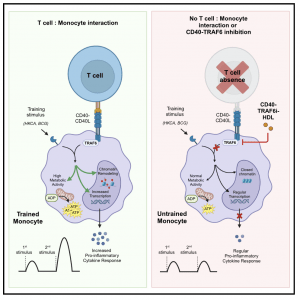In a recent study, researchers have revealed a groundbreaking discovery: T cells, key players in the adaptive immune system, can influence the memory of innate immune cells (Figure 1). This finding challenges our previous understanding of these two immune systems operating independently.
The innate immune system is our body’s first line of defence, responding quickly to threats. The adaptive immune system, while slower to react, is highly specific and develops memory to fight off future infections. Previous research has shown that innate immune cells can also develop memory, a phenomenon known as trained immunity. However, the new study shows that T cells play a crucial role in regulating this process.
By interacting with innate immune cells through the CD40 molecule, T cells can modulate their memory response. This has significant implications for diseases like autoimmune disorders, cancer, and organ transplantation, where trained immunity can be both beneficial and harmful.
In a mouse model, researchers were able to prevent organ rejection by temporarily blocking the interaction between T cells and innate immune cells. This suggests that targeting this interaction could be a promising therapeutic approach.
The study’s findings highlight the complex interplay between the adaptive and innate immune systems and offer new insights into the mechanisms underlying immune memory. By understanding how T cells influence innate immune memory, researchers may be able to develop novel treatments for a variety of diseases.
Journal article: Jacobs, M.E., et al., 2024. Trained immunity is regulated by T cell-induced CD40-TRAF6 signaling. Cell Reports.
Summary by Stefan Botha











